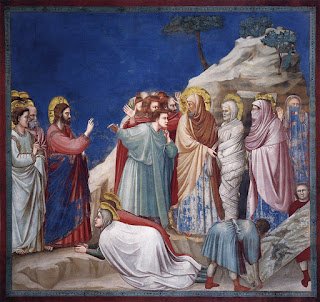Humankind unbound
The constant
question that St Paul poignantly asked persists hauntingly about who will
deliver us from this body of death (cf. Rom 7:24). This question can perhaps be
detected as implied in Martha’s words to Jesus that if he had been there her
brother wouldn’t have died. The dialogue that follows, however, leads beyond
Jesus offering the distraught sister only words of consolation and comfort of
sympathy, for he shares her grief expressed in the fact that he wept, as this
passage of the Gospel records. The significance of this, while certainly
indicating that he was no stranger to human feelings for his close friends at
Bethany, must, nevertheless, also be seen in relation to that other occasion
when he wept over the city of Jerusalem because of its lack of faith in him
(cf. Lk 19:41). The New Testament also states that he offered prayers with
tears because of the destructive evil in which the world is held bound (cf. Heb
5:7f.).
Jesus’ sharing the grief of the two sisters over the death of his friend
Lazarus, thus, was not merely out of sentimental pity. While it is true that the great
tragic dramas of the ancient Greeks celebrated an awareness of pity for the
desolate state of human beings, Simone Weil pointed out that a seeking for
mercy arises from God, not the sufferer, and it is an offence to God to neglect
or ignore the sufferer (cf. Intimations
of Christianity Among the Ancient Greeks, London: Routledge, 1998, p.71). The
crux of Tolkien’s great work may be seen in Bilbo Baggins sparing the life of
the wretch Gollum through pity. On the other hand, the
sentiment of pity may sometimes easily slide into a loathsome
standoffish posture of self-congratulatory complacency rather than in reality wanting
to or fearing to get involved in another’s suffering. Jesus, however, showed something far higher than the
sentiment of pity. His was genuine empathy, that most noble attitude of
compassion akin to the godly virtue of merciful caring.
In sharing utterly that soul-anguish in the depth of every person –
namely, that of facing up to the inevitable condition of death - Jesus came as
the Wounded Healer to be God’s suffering-Servant to liberate all humankind as
foretold by the prophet Isaiah (cf. Is 53:3). As the Messiah, God’s anointed
one or Christ, he alone can declare: “I AM the Resurrection and the Life.” By
this statement Jesus proclaims his identity with Yahweh the unique Life-Giver. As
on other instances, this self-affirmation is the heart of the Christological
teaching of the Gospel of John (e.g. Jn 6:35; 8:12; 8:58; 10:9; 10:11; 14:6;
15:5). In virtue of being the unique revealer of the New Humankind, Jesus
issues the command to release Lazarus from the bands of death: “Unbind him; let
him go free.”
Because spoken with authentic divine authority, by this command Jesus
proclaimed the effectiveness of the entirely new order of humankind – something
that could never be introduced despite the beauty of language such as the
romantic poet Percy Bysshe Shelley endeavoured to articulate in his drama Prometheus Unbound, which was a work
composed in the aftermath of and inspired by the slogan of the French
Revolution, “Liberty, Equality, Fraternity.”
The last two lines of this poem may be taken as summing up the ideals
celebrated throughout the whole work:
Good, great and
joyous, beautiful and free;
This is alone
Life, Joy, Empire, and Victory.
Pope Francis has on many occasions pointed out abstract ideologies get
us nowhere; ultimately the Gospel is not a theoretical refuge from the pain of
living amidst people, but plummets us into the realistic task of encountering
Christ in our neighbour as brothers and sisters, children of the one God and
Father of all humankind. To employ a phrase like “human race” or even “masses”
misses the point, dodges the crucial issue of looking into individual person’s
faces and eyes.
“Humankind” is a word on the other hand that encapsulates far
better the relational reality entailed, ‘kind’ suggesting the significance both
of being kindred and also the befitting attitude of kindness. Beyond this and
above all, however, a civilization of love stands or falls unless it is
inspired and guided by our Lord’s great challenge about showing a ray of God’s
loving mercy: “Whatever you do for one of these my little ones, you do unto
me.” In expressing this we become enabled to share already and truly in the abundance
of eternal Life revealed by Jesus, whose dominion as the Risen Lord is
foreshadowed in calling Lazarus out from the tomb and, moreover, commanding
that he be released from being bound in what seem like swaddling clothes
restricting the movement of an infant’s limbs from expressing the new life of
freedom in grace. The commemoration of this event on the fifth Sunday of Lent is
a prelude preparing us already to enter more deeply into the communion of joy
and freedom and fraternity of humankind
unbound in the Paschal Mystery of Easter.
_____________________________

No comments:
Post a Comment